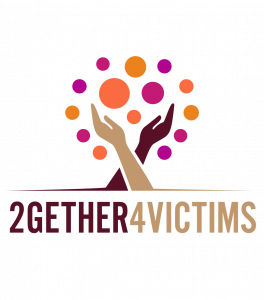2Gether4Victims

The Project 2Gether4Victims – Coordinating and harmonising Generic and Specialist Support services for victims of gender-based violence (2G4V) brings together 11 partners from 7 countries with the aim to improve the provision of support services in a gendered way to victims of gender-based violence and domestic violence (GBV/DV) and improve the system of individual needs assessment for victims of GBV/DV.
The partnership examines what it means to have gendered support services for victims of DV aims to provide an evidence-based analysis of how generic and specialist victim support services can collaborate in responding to needs of victims of GBV/DV across the EU.
The project seeks to identify gaps in how the response to GBV victims is organised, as well as best practices in both generic and specialist support services and propose a tailored, exhaustive, victim-centric response to victims of GBV.
The project, funded by the CERV program of the European Commission, runs for 36 months and started in April 2023.
Partners
- Victim Support Europe (VSE)
- Associacao Portuguesa De Apoio A Vitima (APAV)
- Feministas Em Movimento Associacao (FEM)
- Udruga Za Podršku Žrtvama I Svjedocima (VWSSC)
- Zenska Soba Centar Za Seksualna Prava (Women’s Room)
- Viesoji Istaiga Vilniaus Pazangiu Studiju Institutas (VILIAS)
- Viesoji Istaiga Klaipedos Socialines Ir Psichologines Pagalbos Centras (KSPSC)
- Mykolo Romerio Universitetas (MRU)
- Andavi – France Victimes 58
- Association For The Prevention And Handling Of Violence In The Family (APHVF/SPAVO)
- Slachtofferhulp Nederland (SHN)
- Associate Partner: La Strada International (LSI)
Objectives:
The objectives of the project are to:
- Explore what constitutes a gendered provision of both generalist and specialist services for victims of GBV/DV;
- Propose indicators on how the gendered provision of services can be measured and verified;
- Explore how generalist and specialist providers of services can best collaborate and coordinate their response to the needs of victims of GBV/DV;
- Deliver solutions for organisations to improve their own practices and operations to better respond to requirement for gendered support from an institutional level;
- Develop tailor-made approaches to identify and respond to victims’ individual needs;
- Build capacity of partner and non-partner organisations to better respond to the needs of GBV/DV from both the organisational and individual perspective.
Activities:
- Research and analysis
- Tools development (organisational self-assessment and individual needs assessment)
- Capacity building (training and study visits)
- Piloting and implementation of tools
- Communication and Dissemination
(Expected) outcomes:
- National and international research report
- Organisational self-assessment tool
- Individual needs assessment tool
- Training modules and training delivery
- Implementation of the tools
- Dissemination activities (podcasts, campaigns, events)
Funded by

DISCLAIMER: The contents of this publication are the sole responsibility of Victim Support Europe and do not necessarily reflect the opinion of the European Union.
